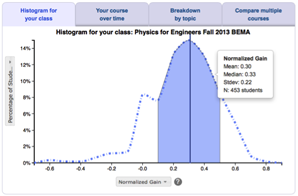Developed by Homeyra Sadaghiani and Steven Pollock
| Purpose | To assess students’ knowledge about main topics of quantum measurement at the junior level. |
|---|---|
| Format | Multiple-choice |
| Duration | 50 min |
| Focus | Modern / Quantum Content knowledge (wave functions, measurement, time dependence, probability, infinite square well, 1D tunneling, energy levels, spins) |
| Level | Upper-level |
Sample questions from the QMCA:
QMCA Implementation and Troubleshooting Guide
Everything you need to know about implementing the QMCA in your class.
Login or register to download the implementation guide.
An online version you can administer for your class is available on LASSO.
The Colorado Science Education Initiative (SEI) and collaborators have developed a wide range of curricular materials for teaching junior-level quantum mechanics, of which the QMCA is only one. Please visit the course website for other materials such as group activities, clicker questions, and homework.
more details
This is the highest level of research validation, corresponding to all seven of the validation categories below.
Research Validation Summary
Based on Research Into:
- Student thinking
Studied Using:
- Student interviews
- Expert review
- Appropriate statistical analysis
Research Conducted:
- At multiple institutions
- By multiple research groups
- Peer-reviewed publication
The multiple-choice questions on the QMCA were developed by first converting the open-ended questions on the QMAT to a multiple-choice format and creating eight new questions. To create the multiple-choice answers, open-ended responses to QMAT questions, responses in student interviews, and expert feedback were used and a literature review was conducted. This initial version of the QMCA was given to over 50 students, and 13 of these students participated in follow-up interviews. The questions were revised and given to an additional 263 students taking upper-division quantum mechanics at 10 intuitions. Appropriate statistical analysis of reliability, difficulty and discrimination were conducted and reasonable values were found. The QMCA has been tested with over 300 students and the results are published in two peer-reviewed publications.
References
- S. Goldhaber, S. Pollock, M. Dubson, P. Beale, and K. Perkins, Transforming Upper-Division Quantum Mechanics: Learning Goals and Assessment, presented at the Physics Education Research Conference 2009, Ann Arbor, Michigan, 2009.
- J. Kruse and B. Wilcox, Rasch Analysis of the Quantum Mechanics Concept Assessment, presented at the Physics Education Research Conference 2023, Sacramento, CA, 2023.
- E. Palmgren, K. Tuominen, and I. Kontro, Self-efficacy and conceptual knowledge in quantum mechanics during teaching reforms and the COVID-19 pandemic, Phys. Rev. Phys. Educ. Res. 18 (2), 020122 (2022).
- S. Pollock, G. Passante, and H. Sadaghiani, Adaptable research-based materials for teaching quantum mechanics, Am. J. Phys. 91 (1), 40 (2022).
- A. Quaal, G. Passante, S. Pollock, and H. Sadaghiani, Exploratory factor analysis of the QMCA, presented at the Physics Education Research Conference 2020, Virtual Conference, 2020.
- H. Sadaghiani, Spin First vs. Position First instructional approaches to teaching introductory quantum mechanics, presented at the Physics Education Research Conference 2016, Sacramento, CA, 2016.
- H. Sadaghiani, J. Miller, S. Pollock, and D. Rehn, Constructing a Multiple-choice Assessment for Upper-division Quantum Physics from an Open-ended Tool, presented at the Physics Education Research Conference 2013, Portland, OR, 2013.
- H. Sadaghiani and J. Munteanu, Spin First instructional approach to teaching quantum mechanics in sophomore level modern physics courses, presented at the Physics Education Research Conference 2015, College Park, MD, 2015.
- H. Sadaghiani and S. Pollock, Quantum mechanics concept assessment: Development and validation study, Phys. Rev. ST Phys. Educ. Res. 11 (1), 010110 (2014).
- J. Wells, H. Sadaghiani, B. Schermerhorn, S. Pollock, and G. Passante, Deeper look at question categories, concepts, and context covered: Modified module analysis of quantum mechanics concept assessment, Phys. Rev. Phys. Educ. Res. 17 (2), 020113 (2021).
- B. Wilcox and S. Pollock, Investigating students’ behavior and performance in online conceptual assessment, Phys. Rev. Phys. Educ. Res. 15 (2), 020145 (2019).
PhysPort provides translations of assessments as a service to our users, but does not endorse the accuracy or validity of translations. Assessments validated for one language and culture may not be valid for other languages and cultures.
| Language | Translator(s) | |
|---|---|---|
| Portuguese | Ricardo Kagimura |  |
If you know of a translation that we don't have yet, or if you would like to translate this assessment, please contact us!

Login or register to download the answer key and an excel scoring and analysis tool for this assessment.
Score the QMCA on the PhysPort Data Explorer
With one click, you get a comprehensive analysis of your results. You can:
- Examine your most recent results
- Chart your progress over time
- Breakdown any assessment by question or cluster
- Compare between courses
| Typical Results |
|---|
Typical scores on the QMCA Version 5.5.7 from Sadaghiani and Pollock 2014. Below are students’ mean scores on the beta version of QMCA, organized based on the type of university. (Repeated name codes mean consecutive semesters at the same institution) N is the number of students in the class. The red dashed line represents the weighted average for all students across different institute, which was 54%.
|
The latest version of the QMCA, released in Fall 2018, is version 6.6.2. Version 6.6.2 contains BOTH spins and wave functions variants of some questions. The previous version, Version 5.5.7, included only questions with a wave function context (no spin). This instrument was adapted from an open-ended instrument known as the Quantum Mechanics Assessment Tool (QMAT). Earlier versions of the multiple-choice version were known as the QMAT-MC, before it was renamed the QMCA.
Variation
|
|
Quantum Mechanics Assessment ToolContent knowledge Modern / Quantum (wave functions, measurement, time dependence, probability, infinite square well, 1D tunneling, energy levels)Upper-level Short answer |






